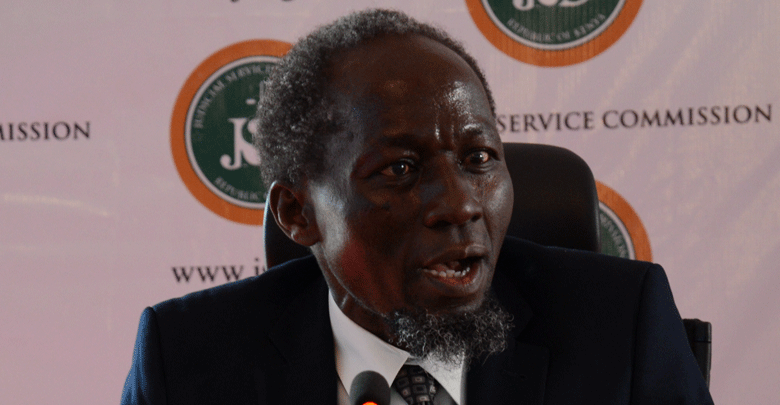Marete: Why I jailed staff for making noise in court

Employment and Labour Relations Court Judge Njagi Marete was yesterday at pains to explain why he jailed some of his staff for making noise in the corridors of the court.
This is after the Judicial Service Commission (JSC) received some complaints against the judge by his staff who had accused him of being high-handed.
The judge had arrested and punished a court staff for making noise on the corridors when the court was in session.
In his defence, Marete said the issue had gone on for six months and senior officers tried to handle it using other mechanisms without much success.
“For a long time, we have had this issue and it is not going away. We cannot sustain this. On this day, we heard (the) noise and asked my staff to have those making the noise called in.
One was brought in and the other one said he was not coming in. What I did was stop proceedings and had the person brought in and put in jail,” he said.
He added: “If you read the ruling clearly you would appreciate this was not a one day matter but one that had gone on for six months.
The chief magistrates had taken steps to fight this menace and it would not go away. So for a long time, we had this issue and it was not going away. We cannot sustain this.”
During the interviews for the position of the next Chief Justice, Marete was also compelled to explain why he used a judgment in his own case against Teachers Service Commission (TSC) as authority in a different case which involved Maasai Mara University.
While quoting the TSC judgment, he had referred to the judge who made the decision as a good friend of his and a brother.
He said he is a student of literature and issues of perception would not arise on his use of language. “It’s a question of expression throughout our jurisprudence.
I haven’t found anyone who had good determination on retirement. It was beautiful and nice. I am a student of literature and I believe in expression. It could be an issue if you are a simpleton,” he said.
Police drivers
The judge was also put to task by Commissioner Justice Mohammed Warsame to explain why his card for persons with disabilities indicates that he suffers from a mental illness.
Marete said he is visually impaired and was assessed and given a card six years ago that shows that he is a person living with disability.
However, Justice Warsame noted that on his disability card, it shows that he is visually impaired and mental asking him if it’s true that he has mental issues.
“I have no mental issues. There was an error on my card and I have never had the time to correct the issue.
I highlighted I have visual disability and diabetes from time to time,” said Marete.
Judge Marete said the word mental on his card was an oversight because during the assessment he told them he has Hypoglycemia but they decided to put his case as mental.
Marete said he has had trouble with his police drivers normally allocated to judges saying the officers were too impatient and always left him.
“One lasted a day with me; another lasted a week while the best lasted three months. They are impatient. I don’t know why they leave,” he said.
Police drivers
The judge, who was appearing before the 10-member JSC panel, was also at pains to explain why he chose his spouse as his personal aide to which the judge answered that it is for medical considerations.
He said he needs her company every time due to his medical issues and that forced him to take his spouse as an aide.
“My spouse must accompany me because of my medical issues. Why won’t you compensate my spouse, as my employer?
The commission further put to task the Labour Court judge, who besides having a law degree also has a diploma in theology, on whether he had used theology to influence his rulings and judgments.
“Even if you are not a Christian, there is some religion that guides you, including African traditional religion.
We were not called to (the) Judiciary to come and preach, we were called to come and practice judicial law,” he said in response to questions from Deputy Chief Justice Philomena Mwilu.
On his leadership skills, he says his track record speaks for itself saying the commission should go to his farm in Chuka and see how he takes care of his two cows and coffee farm.
Although, he has not served in a big office, judge Marete said his past work at Sheria House speaks for itself and given the chance to be CJ, he is equal to the task.
“Daring is my other name, there’s nothing which shakes me. This office requires somebody who will resist anybody who comes in to fool around with the Judiciary,” he said.
Marete told the commission that if given the job, he will ensure Judiciary will fully go digital and will also tackle the problem of understaffing.
On the 41 judges whose swearing in has never happened after President Uhuru Kenyatta expressed reservations, he said, they should have been already working to ensure delivery of Justice to Kenyans.
Under his leadership, he said, he will engage in talks with the Executive to ensure the judges are sworn in.
Private practice
Marete during noted that the Judiciary needs more judges to be able to clear the issue of backlog of cases.
Asked why his private practice only lasted 11 months before he sought employment,he explained private practice is not his cup of tea because he is a public servant.
“I realised I was not a politician so I came back to pursue my profession. I have always known I am not a practitioner.
There are so many things I can do with law but not as a practitioner. I have my limitations. Private legal practice is not my thing,” said the judge.
He gave examples of first-time ministers in the Jomo Kenyatta regime saying despite being young and having no past experience, they did their work well.
“I don’t see any link between being a CJ and legal practitioner, this is a public office any leader can do particularly if you are fast.”
“In the first Parliament most of the cabinet ministers were in their 30s but we walked through. Jomo Kenyatta was a freedom fighter and not a president before but we walked through.
To gauge what I am capable of doing look at my work at Sheria house. We have not been to these big offices because no one has given us the opportunity,” he said.
The interviews continue today with former Director of Prosecutions Phillip Murgor expected to take the hot seat.









